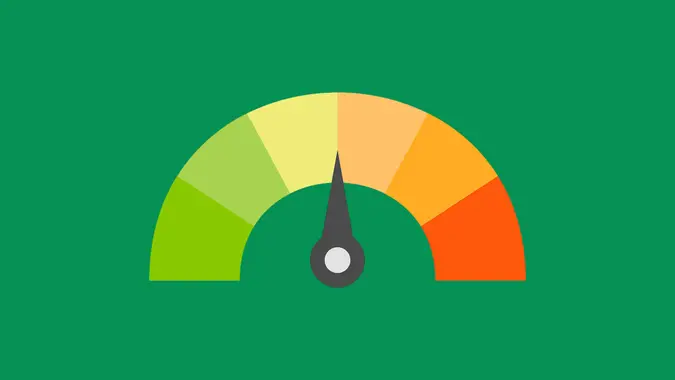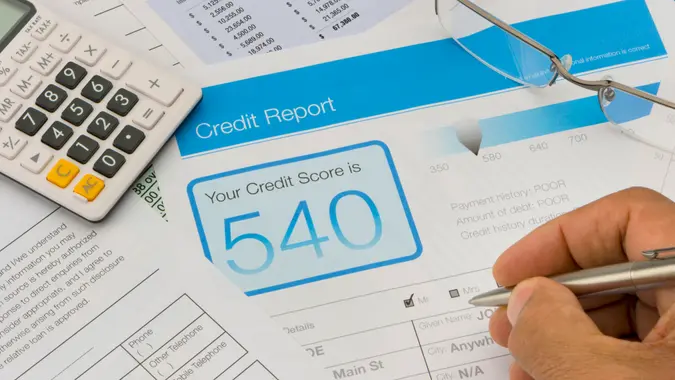How To Contact the Credit Bureaus: A Quick Guide

Commitment to Our Readers
GOBankingRates' editorial team is committed to bringing you unbiased reviews and information. We use data-driven methodologies to evaluate financial products and services - our reviews and ratings are not influenced by advertisers. You can read more about our editorial guidelines and our products and services review methodology.

20 Years
Helping You Live Richer

Reviewed
by Experts

Trusted by
Millions of Readers
The three major credit bureaus — Equifax, Experian and TransUnion — keep track of your credit score and financial history. Ideally, you can pull your credit report every year for free through AnnualCreditReport.com. Once you review your credit report, you may want to contact them regarding disputes, fraud alerts, credit freezes or general inquiries.
Here is a guide on how to contact the credit bureaus.
How To Contact the Credit Bureaus by Phone, Mail and Online
Typically, if there is an error on your credit report, you will want to contact each credit bureau separately. Here is the contact information for each bureau:
Contacting Experian
- Phone: 1-888-397-3742
- Mailing Address:
Experian
P.O. Box 4500
Allen, TX 75013 - Online Support: Experian’s dispute center
Contacting Equifax
- Phone: 1-800-378-4329
- Mailing Address:
Equifax Information Services LLC
P.O. Box 740256
Atlanta, GA 30374 - Online Support: Equifax’s dispute center
Contacting TransUnion
- Phone: 1-800-916-8800
- Mailing Address:
TransUnion Consumer Solutions
P.O. Box 2000
Chester, PA 19016 - Online Support: TransUnion’s dispute center
| Credit Bureau | Phone Number | Fraud Alert Phone Number | Mailing Address |
|---|---|---|---|
| Experian | 1-888-397-3742 | 1-888-397-3742 | P.O. Box 4500 Allen, TX 75013 |
| Equifax | 1-800-378-4329 | 1-866-349-5191 | P.O. Box 740256 Atlanta, GA 30374 |
| TransUnion | 1-800-916-8800 | 1-800-680-7289 | P.O. Box 2000 Chester, PA 19016 |
Reasons You May Need To Contact a Credit Bureau
Once you have a chance to review your credit report, you may need to contact the credit bureaus. Here are a few reasons you may need to contact them:
Identification information is incorrect. The bureaus may have an incorrect name or address listed. In some instances, a similar name may be listed as yours.
You want to get your credit report. To make certain your credit report is error-free, you may contact the credit bureaus for a copy of your report. You’re entitled to one free credit report from each bureau annually.
Address outdated information. You may want to have old accounts removed or accounts that you no longer use removed from your credit report.
Dispute errors on your credit report. Maybe your credit report shows that you have made a payment on a bill or it shows missed utility payments. You want to make certain you address these inaccuracies.
Request a credit freeze or fraud alert. If you’re planning to use your credit, you may want to protect it by placing a credit freeze. If any of your accounts have been subjected to fraud, you may also want to put a fraud alert on your account.
How To Dispute Errors on Your Credit Report
If you find an error on your credit report, you can follow these steps to dispute it.
Online Dispute Process
It doesn’t take long to dispute errors on your credit report. Follow these quick steps:
- Log in to Equifax, Experian and TransUnion dispute center. You have to dispute your error with all three bureaus. You cannot dispute with just one credit bureau.
- Make sure you have your supporting documents regarding your claim.
- You can receive updates via email or mail. The bureau is required to update you within 30 days and provide a resolution.
Mailing a Dispute Letter
If you prefer to contest your dispute via mail, it is similar to the online process. Here are the steps:
- Send a copy of your credit report highlighting the errors.
- Provide a detailed explanation of the error.
- Send via certified mail so you can track the receipt.
How To Place a Fraud Alert or Credit Freeze
You can place a fraud alert or credit freeze with any of the credit bureaus. There is a key difference between fraud alerts and credit freezes.
What Is a Fraud Alert?
A fraud alert notifies lenders of a potential identity theft. Before new credit is issued, extra verification is required. The alert is free and lasts for one year. You’re required to notify only one credit bureau and they will notify the others.
What Is a Credit Freeze?
A credit freeze prevents unauthorized access into your credit file. Credit freezes are free, and you have to request them at each credit bureau.
Whether you want a fraud alert or credit freeze, you can request it online, by phone or by mail.
FAQ
Here are the answers to some of the most frequently asked questions about contacting the credit bureaus.- How long does it take for a dispute to be resolved?
- Credit bureaus typically resolve disputes within 30 days, but it may take up to 45 days in some cases.
- Can I contact one bureau to update all my reports?
- No, you need to dispute errors separately with Experian, Equifax and TransUnion as they maintain independent records.
- Do I have to pay to freeze my credit?
- Credit freezes are free at all three bureaus.
- How often should I check my credit report?
- You should check your credit report at least once a year. However, to look for fraud it is ideal to check your report quarterly.
- Can I contact the credit bureaus on behalf of someone else?
- Yes, but you may need prior authorization or a power of attorney to do so.
Stacey Bumpus contributed to the reporting for this article.
 Written by
Written by  Edited by
Edited by 






















